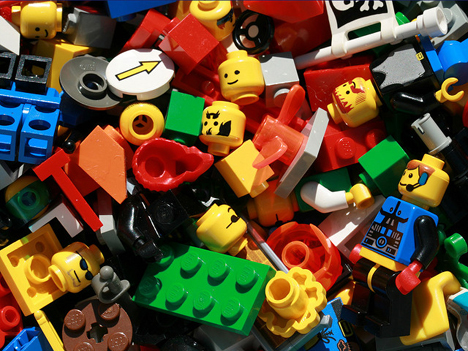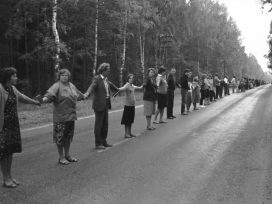The future of the state and the state of the future
In a new economy, the contours of which we are only beginning to grasp – post-industrial, post-scarcity, post-work – what might the state look like? How will a society of people who do not “go to work” in a twentieth-century sense be governed? Are we in for a “new socialism” or for the dissolution of the traditional nation-state, and are these two scenarios really different? What will happen to those who do not fit into this brave new world?
In the marketplace of predictions for the future of the state, there are currently two lines of thought that are best represented. There is the notion of the impending state-as-service, which brings together producers and consumers of services, thereby minimizing or automating itself almost completely. This networked state, the UBER-state, is not a “vertical of power,” but a coordinator of horizontal structures of civic self-government and self-service. In this libertarian scenario, the government retains only the functions of legitimate violence (border protection, army, police, penitentiary system) – although even here traditional armies and battle lines will be replaced by military companies, operators of drones and pilotless planes, and hybrid conflicts, in which the main component is not direct violence, but propaganda and the media. Even the state’s fiscal duties will be shrunk as much as possible – to the level of the concrete taxpayer, because after all, the taxpayer is a consumer of government services.
This notion makes sense: new technologies are capable of thoroughly individualizing civic life, both through the return of elements of direct democracy (as a permanent referendum through networked resources) and via technological means. For example, the true “vertical of power” in big cities are the central heating pipes. If an individual energy source is responsible for delivering heating and energy to each house, it changes both the system of city government and civic consciousness.
“New Socialism”
The second popular scenario appears to be headed in the opposite direction; it is possible, however, that it does not differ so strongly from the first, but rather dovetails with it (or envelops it entirely, depending on your point of view). This is the notion of so-called “new socialism” – an order of things in which the citizens of developed countries receive a direct monetary income based solely on the fact of their citizenship. News from Finland that caught the attention of many Russians – “the government has decided to pay each citizen 550 Euros per month” – has so far turned out to be a variant on the familiar concept of the monetization of welfare benefits, the replacement of social guarantees with monetary payments. An analogous proposition in Switzerland was voted down in a referendum on June 2016 was: the proposal was to pay every resident of the country, including minors, a “citizen’s income” that enables a “dignified existence”. Since January 2016, every resident of the Dutch city of Utrecht has received a “guaranteed basic income.”

Photo: woodleywonderworks. Source: Flickr
New attention-grabbing research in the fields of sociology and political science disproves the old truism about teaching a man to fish: the best results in the struggle against poverty are yielded not by social programs (which demand an expensive and extensive accounting and monitoring apparatus) but the direct distribution of money to households.
This is usually explained through humanitarian arguments: the rich thought that the poor were poor because of their own laziness and depravity, and thus they made the receipt of welfare dependent on fulfilling complicated and demeaning conditions, assuming that without them the recipients would drink it all away or otherwise waste it. But it turned out that the poor are poor because they have been unjustly excluded from the global system of wealth distribution, and if we simply give them money, they will spend it like all normal people – on additional food and items for their children.
But if we put aside these moral considerations, it becomes clear what this policy leads to: the direct stimulation of consumer demand. The automation and roboticization of production, simultaneously increasing its efficiency and the productive power of labor, render first-world societies richer, while also destroying thousands of jobs. In a post-scarcity economy, a citizen’s first duty becomes not production but consumption – participation in the consumerist food chain, encouraging blood flow through the vessels of the economy. It is this very “societal system of distribution” from which the poor are excluded. This is precisely what one of the world’s most successful investors, Ray Dalio (the head of Bridgewater), recently spoke about, discussing the idea of “helicopter money” – direct payments to households as a means for stimulating demand.
An era of post-statism?
It is interesting that in both scenarios it becomes clear that the centralized state is dissolving, giving way, on the one hand, to a system of increasingly “small-scale” local self-governance, and on the other to supranational economic and political unions between states. This is most reminiscent of the situation from the Late Middle Ages to the dawn of the Age of Absolutism: free cities, small kingdoms and duchies within a structure like the Holy Roman Empire (whose head was elected) or the Hanseatic League, and above all of this the unifying notion of Christendom (with the related idea that its values must be spread among all still-unenlightened nations).
A recurring aspect of these forecasts is that the hallmark of the future increasingly tends to be the replication of medieval practices on a new technological level. The cult of manual labor, “makerism” and artisanship, working from home (with the computer as the new spinning wheel), self-regulating organizations as new guilds, and even new hybrid private-state services, suspiciously reminiscent of good old tax farming. On the other hand, everything that might remind us of the “big state” of the nineteenth and twentieth centuries seems to be leading to backwardness and defeat in a competition that spans the globe: big armies, state-financed industries, hierarchical bureaucracy, and the unitary state.
We do not fully realize the degree to which our implicit conceptions of the state and civic life are shaped by the absolutist period. The ideas of nationalistic patriotism, dreams of enlightened monarchy (masquerading in our times under the guise of “authoritarian modernization”), the association between centralization and efficiency, the enchantment of “greatness”: all of this adds up to the ethics and aesthetics of the absolutist European monarchies and their successors, national industrial states.
All these various scenarios for the medium-term future can be read as a unified scenario for moving into an era of post-statism. Will the new state be invisible or all-pervading, or will it be both at the same time? After all, it is evident that total transparency, electronic document management and all variations on the theme of “open government” and the proverbial Big Brother, the all-seeing eye of the state, are one and the same. The state of the future will be transparent – but the citizens of the future will also become completely transparent. Every moment of their lives will be recorded by numerous video services, but even more than that: they themselves will describe it all, entirely voluntarily, on social media – those new arenas of civic life, where we might well soon run for office, and vote, and hold protests, and use government services.
For Russia the prospect of a “post-work state” sounds, on the one hand, like a fairy-tale of a communist future – “from each according to his abilities, to each according to his needs” – and, on the other hand, suspiciously familiar. In a certain way, we have already shown the world what it would look like to have a state that distributes economic rent (though produced not by advanced technology, but by the export of natural resources) between an army of pensioners, state employees, and the pseudo-employed – people working for inspection, control, monitoring, and special services. Under this system, citizens’ primary virtue is in no way their high labor production – no one needs their work – but their loyalty, which expresses itself as passivity. The twilight of the era of carbon fuels is forcibly driving Russia out of its rosy oil-fueled paradise into reality, where you have to adapt to circumstances, rather than making circumstances adapt to you. Has it not (yet again) managed to show a bureaucratized Europe, clinging to its traditional leftist sympathies, a negative example?
The prospect of missing the train bound for a bright tomorrow is frightening. Of course, historical time flows for everyone – you cannot wall yourself off from it. No actor of a historical process can bury his head in the sand of the comfortable present, having declared that he does not like the changes that are happening and that he does not want to take part in them. The future will come for everyone, but not everyone will hold an equal place in it. From this point of view contemporary Russian statehood, built on a paternalistic model of the centralized distribution of resources, looks audaciously archaic. Civilized humanity’s loss of interest in what little Russia can offer external markets – carbon fuels and metals – threatens to turn a rich autocracy into a poor autocracy, without changing its essential nature. And that is a recipe for decline. In the “brave new world” of post-deficit and post-work, countries that lag behind may turn out to be not only zones of low consumption – that can be survived – but zones of violence.
Published 13 December 2016
Original in English
First published by IWM Post No 117 (spring/summer 2016) (English version); Vedomosti, 23 February 2016 (Russian version)
© Ekaterina Schulmann / IWM Post / Vedomosti / Eurozine
PDF/PRINTIn collaboration with
In focal points
Newsletter
Subscribe to know what’s worth thinking about.
Related Articles

The ‘Trump–Putin deal’ again places Ukrainians in a subaltern role. The leaked contract with its fantasy $500 billion ‘payback’ has been compared to Versailles, but the US betrayal recalls nothing so much as Molotov–Ribbentrop.

Ukraine faces its greatest diplomatic challenge yet, as the Trump administration succumbs to disinformation and blames them for the Russian aggression. How can they navigate the storm?






